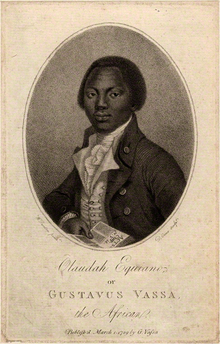
Back أولوداه اكيوانو Arabic Olaudah Equiano Catalan Olaudah Equiano Czech Olaudah Equiano Welsh Olaudah Equiano German Olaudah Equiano Spanish Olaudah Equiano Basque الاودا اکویانو Persian Olaudah Equiano Finnish Olaudah Equiano French
Olaudah Equiano | |
|---|---|
 Equiano by Daniel Orme, frontispiece of his autobiography (1789) | |
| Born | c. 1745 Essaka in Igboland |
| Died | 31 March 1797 (aged 52) Westminster, Middlesex, United Kingdom |
| Other names | Gustavus Vassa, Jacob, Michael |
| Occupations |
|
| Known for | Influence over British abolitionists; The Interesting Narrative of the Life of Olaudah Equiano |
| Spouse |
Susannah Cullen
(m. 1792; died 1796) |
| Children | Anna Maria Vassa Joanna Vassa |
Olaudah Equiano (/əˈlaʊdə/; c. 1745 – 31 March 1797), known for most of his life as Gustavus Vassa (/ˈvæsə/), was a writer and abolitionist. According to his memoir, he was from the village of Essaka in modern southern Nigeria.[1][2] Enslaved as a child in West Africa, he was shipped to the Caribbean and sold to a Royal Navy officer. He was sold twice more before purchasing his freedom in 1766.
As a freedman in London, Equiano supported the British abolitionist movement, in the 1780s becoming one of its leading figures. Equiano was part of the abolitionist group the Sons of Africa, whose members were Africans living in Britain. His 1789 autobiography, The Interesting Narrative of the Life of Olaudah Equiano, sold so well that nine editions were published during his life and helped secure passage of the British Slave Trade Act 1807, which abolished the slave trade.[3] The Interesting Narrative gained renewed popularity among scholars in the late 20th century and remains a useful primary source.[4][5]
- ^ Lovejoy, Paul E. (2006). "Autobiography and Memory: Gustavus Vassa, alias Olaudah Equiano, the African". Slavery & Abolition. 27 (3): 317–347. doi:10.1080/01440390601014302. S2CID 146143041.
- ^ Christer Petley, White Fury: A Jamaican Slaveholder and the Age of Revolution (Oxford: Oxford University Press, 2018), p. 151.
- ^ Equiano, Olaudah (1999). The Life of Olaudah Equiano, or, Gustavus Vassa, the African. Mineola, NY: Dover Publications. ISBN 978-0-486-40661-9.
- ^ F. Onyeoziri (2008),"Olaudah Equiano: Facts about his People and Place of Birth" Archived 17 October 2017 at the Wayback Machine.
- ^ Carretta, Vincent (2005). Equiano, the African: Biography of a Self-Made Man. University of Georgia Press. p. xvi. ISBN 978-0-8203-2571-2.